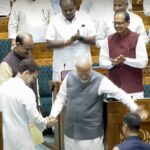After his arrest, Arvind Kejriwal withdrew the petition he had filed in the Supreme Court challenging the High Court’s order that stayed his bail.
The CBI arrested Delhi Chief Minister Arvind Kejriwal on Wednesday in connection with the liquor policy case, following approval from the Rouse Avenue Court to examine the AAP leader in court.
After his arrest, Kejriwal withdrew his petition from the Supreme Court that challenged the Delhi High Court’s order staying his bail in the money laundering case.
Kejriwal had previously been arrested by the ED on March 21 in the money laundering case related to the alleged liquor policy scam and is currently held in Tihar Jail.
During the trial court hearing, the CBI argued that Kejriwal’s custody was necessary to confront him with documents. The CBI claimed that Kejriwal blamed former Delhi minister Manish Sisodia, stating it was Sisodia’s idea to privatize. Additionally, the CBI alleged that Kejriwal mentioned Vijay Nair, the former AAP communications head and an accused in the case, worked under Atishi and Saurabh Bhardwaj.
“The Chief Minister didn’t take any ministry but has his hand in everything,” the CBI lawyer stated.
Kejriwal’s lawyer, Vikram Chaudhari, opposed the CBI’s request, arguing that they were not informed about the CBI’s application to the court for permission to question Kejriwal.
“The manner in which this has been done is of grave concern. Please allow us access to the documents and defer this hearing to tomorrow. Heavens will not fall if we file a reply,” Chaudhari said.
The CBI recorded Kejriwal’s statement from jail on June 25 and sought his production before the trial court on Wednesday.
Representing the CBI, senior advocate DP Singh argued that investigation is the agency’s prerogative and the law does not require informing the accused in advance.
“The law does not say that I have to tell them when I want to go and investigate him. The same thing happened in the case of K Kavitha. I only need the court’s permission,” Singh stated.
Kejriwal’s lawyer contended that no Section 41 notice under the Code of Criminal Procedure (CrPC) was issued for Kejriwal to appear for questioning.
“If my lords allow them to arrest him, my lords will be allowing their shoulders to be used as a gun to shoot him. If my lords give them the permission to arrest, my lords will effectively be sanctifying the remand,” he argued.












